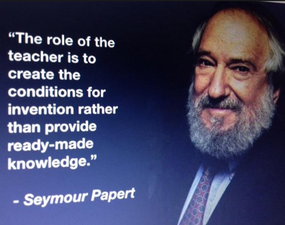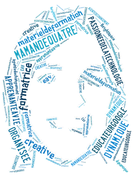 From Ron Canuel's keynote presentation at On the Rise K-12 conference, April 23 2015.
From Ron Canuel's keynote presentation at On the Rise K-12 conference, April 23 2015. What else am I taking away from #OTRK12?
Laughter
My first takeaway might surprise you a little. It comes from our second day keynote speaker Jessica Holmes. It was unusual and refreshing to have a keynote speaker who wasn’t talking about education, but rather to educators. Her message to us as I interpreted is: take care of yourselves! I think it is fair to say that often, as educators, we work, we work and we work and … we might forget to take care of ourselves a little! One great way to do that: laugh. For those of you who know me well, you know I love to laugh! So, I got from Jessica’s keynote : allow yourself to have a good laugh, allow yourself to laugh with someone, allow yourself to laugh at yourself … It feels good and makes everyday better! You think I’m crazy?! Google it: you’ll see! Or, read this article and the many links it provides : “Why laughing is so good for your health.”
Collaboration
My second takeaway is nothing revolutionary, but attending the conference and observing the participants in actions just reinforced my strong beliefs in the strenght of sharing and collaborating as educators (and hell, as humans!). We have to stop our isolation. (Add-on : I just saw a Google+ post from Eric Sheninger redirecting to his blog post titled Will you break the code of silence) … exactly what I am saying!!!) All the sessions were led by educators who decided to share : their practices, their strategies, their trials, their successes or their no sucesses! All, so that others could benefit from their experiences, could take something from those experiences, could build on those experiences. This is how we grow as an educator, as a person.
In their presentation Transforming Learning in Digital Spaces : What we have learned so Far, e-learning teachers from Algoma District School Board demonstrated the strengths of a teacher collaborative inquiry. Teachers from different geographical area of the board’s territory with a common purpose of enhancing e-learning experience work together to create a rich learning environment for their students. Their students would not have the learning experiences that they have without these teachers agreeing to share, being open to the sharing of others and collaborating.
In his presentation Shift Education : Embracing Education, David Trust demonstrated many examples of the impact of sharing and collaborating. When he presented the work done at Inquiry Hub Secondary School, he emphasized the collaborative work of all people involved. Yes, he might help coordinate the activities, but the experiences students are able to live are facilitated by a team of educators working together to provide these experiences to their students.
“Grade free” classroom
My third “bigger” takeaway is the start of a conversation, I believe, we will be having for a while: what about grades and report cards?
As a growing mass of educators is now convinced of the impact of immediate feedback, feedback to improve learning, feedback to allow students to bring their understanding further, to demonstrate their understanding in different ways and leaving traces of this in their eportfolio, what is the value of grades? What is the value of report cards? This is a very big reflexion and a conversation that will certainly be an on-going. What are your thoughts? Not sure what to think?! Check out these two resources :
- Engaging Students in a "Grade Free" classroom, a presentation from Karen Locke (On the rise k-12 conference, April 2015).
- The problems with grades and subjectivity in education, a blog post from Fishtreeblog.
Interested to find out more of what happened at On the Rise K-12? Check out the web site : http://www.otrk12.ca; you can find some of the sessions ressources under the Ressources tab. Make sure to also look up the hashtag #OTRK12 on Twitter.
Have fun learning and reflecting!



 RSS Feed
RSS Feed